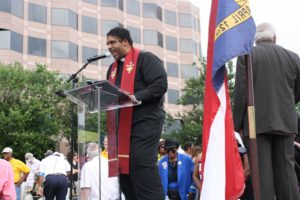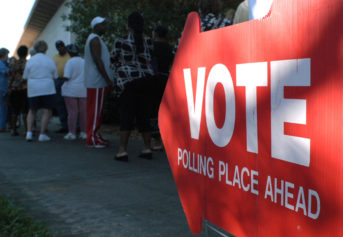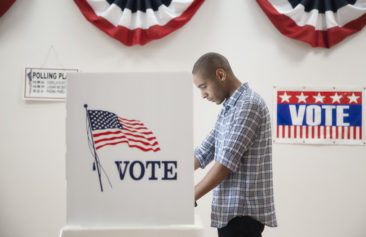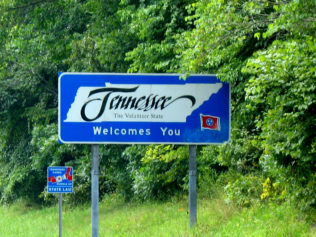An upcoming legal case in North Carolina is living proof the civil rights battles of the 1960s are far from over. According to The Guardian, a federal court in Winston-Salem, North Carolina, will review legal challenges to a law passed by North Carolina Gov. Patrick McCrory seen as restricting Black voting.
Local civil rights activists say the case is the latest battle in a war raging since the ‘60s.
“Fifty years ago, Dr. (Martin Luther) King fought to expand the opportunity to vote. Today, we are in a battle to stop this state from taking rights away from North Carolina citizens – this is our Selma,” said the Rev. William Barber, president of the North Carolina NAACP, the lead plaintiff. About 2,000 people are expected to march Monday in Winston-Salem protesting the state’s voter suppression law.
House Bill 589, North Carolina’s voter restriction law, was upheld by the Supreme Court in 2013. The Supreme Court struck down section 4 of the Voting Rights Act, saying racial discrimination was no longer a problem in the country. However, HB 589, is seen as going after Black voting habits.
Some of the more controversial aspects of the new law are:
- The reduction of early voting days from 17 to 10. According to North Carolina voting data, 70 percent of Black voters used early voting, compared to 56 percent of overall voters. The Guardian said the new law disenfranchised thousands of Black voters in the 2014 midterm elections.
- Elimination of same-day registration allowing people to turn up at the polls, register and vote all on the same day.
- Ending of out-of-precinct voting. The trial is expected to produce experts who will show Blacks vote out of district at higher rates than whites.
- The prohibition of voter drives targeted at young people. The plaintiffs argue banning these drives would lead to 50,000 fewer young voters by 2016.
Republican legislators have already removed part of HB 589 that required voters to produce ID. Although Republicans insist these laws are designed to cut back on voter fraud, incidents of voting irregularities are extremely rare. A Washington Post study found 31 cases of voter fraud out of 1 billion ballots cast since 2000. It seems these laws may be designed to restrict voting by groups who tend to support Democrats — young people, the poor and Black people.
In a legal brief, the plaintiffs argue the new law was clearly designed to reduce the turnout of Black voters.
“The plaintiffs say that if it is allowed to stand, HB 589 will have a chilling effect on black voters and undo the recent gains that have been made in expanding the African American vote in North Carolina,” reported The Guardian. “Between 2000 and 2012, the state rose from 37th in the nation for turnout in presidential elections to 11th – an improvement achieved largely through a surge in the proportion of registered black voters going to the polls that reached 70 percent in 2012.”
However, North Carolina is not alone in passing voter suppression laws.
“According to the Brennan Center, a nonpartisan institute that specializes in voting practices, 21 states have put in place new restrictions over the past five years – 14 of which will have barriers up in the 2016 presidential election,” said The Guardian.
The Voting Rights Act, passed in 1965 by President Lyndon Johnson, was designed to protect Black Southerners against widespread voter intimidation and suppression. While the Supreme Court might argue voter discrimination is no longer a problem, it seems today suppressing Black voters isn’t as blatant as it was 50 years ago. Instead of threatening Black voters, making them pass tests or pay poll taxes, 21st century voter suppression now involves requesting ID and targeting Black voting habits.
However, many Republicans insist these new laws are only designed to ensure voter integrity. South Carolina Gov. Nikki Haley, whose state recently took down the Confederate flag at the Capitol, told Meet the Press host Chuck Todd, Americans should have to prove who they are before they can vote.
“And I think that, having to show a picture ID when you get on a plane, and having to show a picture ID when you buy Sudafed, you absolutely should have to show a picture ID to vote,” Haley said.



